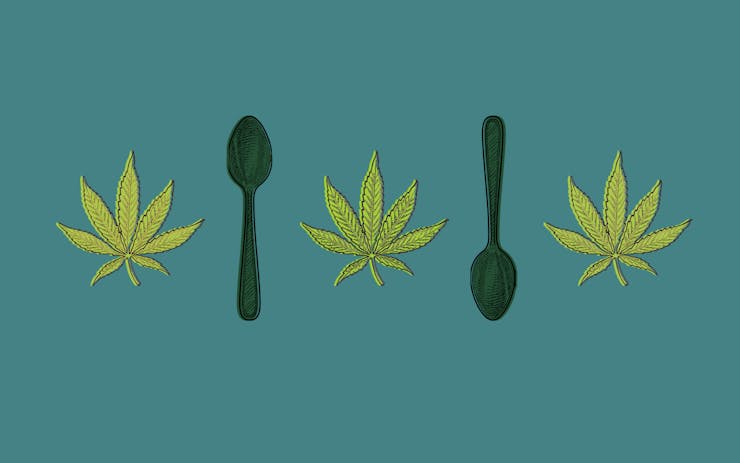Medical cannabis is known for its ability to quell seizures, dull pain, and squash anxiety. It can also aid people with less well-known—but not uncommon—conditions, ones that often come with a life-long sentence. We call ourselves “spoonies.” In my case, fibromyalgia was the main force behind my conversion, but sadly there are a lot of ways to join the ranks.
The term was coined at a diner, when a lupus fighter named Christine Miserandino tried to explain the challenges of living life with the disease to a friend. Her friend knew the facts, but wanted to know what it felt like as an ongoing experience—as a lifestyle. Christine was a bit stunned: trying to sum up the limitations that affect every single aspect of your life is an overwhelming task.
Cannabis is a very common medical aid and ally to spoonies, offering soothing powers to all kinds of symptoms through the power of the body-wide endocannabinoid system.
She then grabbed a bunch of spoons from surrounding tables. She handed her friend the utensil bouquet, telling her that life with chronic illness is like only having so many spoons to get through the day—far fewer than the average person. If she borrows from tomorrow, she might be able to swing what she needs to get done today; but tomorrow has just as few spoons, so she’ll run a high risk of running out. And running out of spoons/overdoing it means big-time symptom flares and even less spoons. Maybe for weeks.
Christine asked her friend to go through her day, removing spoons appropriately as each activity demanded: getting up, showering, getting dressed, eating, etc. Half of her friend’s spoons were gone before she even left the house. Christine told her she had to decide what to miss out on in order to conserve spoons—run errands or make dinner? Wash the dishes or your hair? See a friend or catch up on work?
Her friend became sullen and asked how she possibly dealt with those limitations every day, forever.
A best friend to so many kinds of spoonies
Christine answered her friend’s serious question with a serious answer, and told her that spending her precious spoons chilling together was always a wise expenditure. Personally, I would have added: “And there’s no effing way I could do it without cannabis.” Though it can’t give me desperately needed spoons, cannabis makes getting through a regular spoon-starved day a whole lot more palatable—and a full-blown flare less horrific.
Shop highly rated dispensaries near you
Showing you dispensaries nearCannabis is a very common medical aid and ally to spoonies, offering soothing powers to all kinds of symptoms through the power of the body-wide endocannabinoid system. We’ll touch on five conditions that can turn someone into a spoonie, as well as how cannabis is said to help treat symptoms.
Lupus
In the disease fought by Christine, the body’s immune system becomes hyperactive and attacks normal, healthy tissues, and organs. It affects many different systems, resulting in many different symptoms. These may include extreme fatigue, headaches, painful and swollen joints, fever, anemia, confusion and memory loss, swelling, pain in the chest with deep breathing, hair loss, light sensitivity, abnormal blood clotting, ulcers, and more—including very serious issues like organ failure.
Science is extremely behind the ball when it comes to studying how cannabis can assist chronic illnesses, and the lupus community has not been served in this effort. However, there has been promising results in regard to cannabis aiding other diseases that affect the immune system and inflammatory response. Lupus is nicknamed “The Great Imitator” due to sharing symptoms with other diseases, and science has proven that cannabis aids in many of these shared symptoms. The next disease is one such example.
Fibromyalgia
This is the bugger getting me down. Many kinds of physical pain are involved with this disease, whose cause is unknown. I could write a whole essay on the different kinds of pain, but instead I’ll share that when I broke (nay, shattered/comminuted fracture) my foot a while back I walked on it for ten days because it hurt less than the rest of my body, so I figured it was fine. Oops. And then there’s the mental confusion of “fibro fog,” fatigue, insomnia, and other fun stuff like depression and IBS symptoms.
My dear friend cannabis helps ease the pain, turning cutting shards of glass in my body into warm melty goo. It aids in lifting my spirit, which helps me push through the exhaustion, then gets me to eat through nausea. When I can do no more—when I become spoon-less—cannabis helps me emotionally handle the extreme amount of rest dictated by this advanced stage of the disease. And science backs me up here, with one fibromyalgia study showing so much improvement using cannabis that half of the participants quit their other medications completely.
Myalgic Encephalomyelitis (ME)
Referred to by some as chronic fatigue syndrome, ME causes severe exhaustion, a debilitating symptom that’s often minimized by culture and, deplorably, even by the medical community. The cause is unknown. Rest and sleep don’t improve overwhelming ME fatigue, and it worsens with physical and mental activity. Sufferers also battle headaches, poor memory, difficulty concentrating, dizziness, nausea, palpitations, insomnia, and sore throat or glands.
Unfortunately, science has not studied ME much in general, and not at all in relation to cannabis, but it has been recorded as anecdotally helpful by scientists. Another fibromyalgia study also showed improvement in many overlapping symptoms. Because of the sedative effects of certain cannabis strains, it’s said that using an energizing strain during the day can be crucial factor in improving symptoms of ME. Modest dosing can also prevent feelings of sluggishness.
Crohn’s disease and Colitis
Ulcerative colitis and Crohn’s disease are the two primary forms of inflammatory bowel disease (IBD). They are both characterized by chronic inflammation of the digestive tract, though colitis is limited to the colon and Crohn’s can occur throughout the digestive system. Both diseases can result in abdominal pain, severe diarrhea, rectal bleeding, fever, fatigue, nausea and vomiting, weight loss, anorexia, and malnutrition.
Cannabis can lend a hand in living life with colitis or Crohn’s. It’s often a qualifier in medical cannabis states, with patients using it to fight the full range of symptoms. Cannabis is an effective IBD aid largely because of its ability to reduce inflammation. A small-but-promising study on Crohn’s disease found that participants needed less surgery and reduced bowel movements while using cannabis, as well as drastically reduced need for other medicines.
Endometriosis
A woman’s uterus has endometrial tissue that builds up throughout her hormone cycle, then breaks down and sheds—a never-particularly-fun process called menstruation. In endometriosis, this tissue grows outside of the womb, spreading itself on the fallopian tubes, ovaries, and other organs. When it’s time for the shedding of blood and other cells, they become painfully trapped in the body.
This problem can result in severe menstrual cramps, chronic lower-back, abdominal, and pelvic pain, painful intercourse, painful urination or bowel movements, IBS symptoms, and infertility. Traditional treatments (including risky surgeries) only try to keep the endometriosis from advancing, but cannabis has actually been shown to stop cell growth in mice as well as helping symptoms, especially pain.
We’re more common than culture regards
There’s many more ways to become a spoonie: Lyme disease, multiple sclerosis, Ehlers Danlos syndrome, or Hashimoto’s—all four (and potentially many more) may be aided by cannabis via the body’s widespread endocannabinoid system. It’s frustrating that science doesn’t understand these illnesses quite yet, regardless of the stunning amount of promise it shows in improving the lives of spoonies.
When you total the numbers of Americans estimated to be suffering from the eight diseases mentioned in this article, and there’s many more, you get 91.5 million—that’s about 27% of Americans. Though there is comorbidity to be factored in (people who have more than one of these diseases), there’s also millions still searching for a diagnosis, as well as many conditions that weren’t mentioned.
We’re talking about a lot of people suffering from conditions that are barely regarded by society here. A whole lot. And they are generally invisible illnesses, which adds another dimension to feeling ignored. It’s like we’re drowning a world of problems that only we can see. Hug your spoonies (and maybe smoke ‘em out), because you probably know at least a couple—whether you’re aware of it or not.







